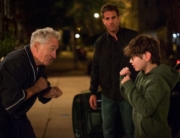
“The Enemy could be their friend, guardian.” – Public Enemy’s “Don’t Believe the Hype” (1988)
The last few years have seen an abundance of films that bring the American black experience to higher artistic levels. We’re witnessing the birth of a new school or renaissance of black auteur cinema that carries on the DIY independent spirit energized by Spike Lee of Fort Greene, Brooklyn, during the 1980s.
Everyone from Jordan Peele to Donald Glover and Justin Simien seems to have been inspired by the accessible state of the art technology and are now creating ambitious pieces of storytelling in a post-Obama world. Open to all types of genres, like horror and superhero movies, the trend now welcomes its very own Bonnie and Clyde (1967), an explosive variation with a long overdue civil rights makeover, Queen & Slim.
Queen (Jodie Turner-Smith) and Slim (Daniel Kaluuya) are a black odd couple out on a first date, brought together by Tinder. Queen is a successful criminal defense lawyer, while Slim is a regular laid-back young man, a Costco employee trying to make ends meet. On their way back to her house in his white sedan (with the license plate “TrustGod”), they are pulled over by a white policeman (Sturgill Simpson) for a minor traffic violation. When the officer turns out to be racist and begins roughing Slim up, Queen grabs her phone to record the incident and the cop grabs his gun. In the split-second melee, Slim takes away the gun and shoots the officer dead in self-defense.
Now on the run as outlaws, the terrified pair leave Cleveland behind to reach Queen’s Uncle Earl (Bokeem Woodbine) in New Orleans so they can get financial help and ultimately escape to Cuba. Oblivious to them, the cop’s dashcam captured the shooting, and it becomes a viral symbol of pain, trauma, and even hope for those who’ve always wanted to fight back against oppression.
Lena Waithe and novelist James Frey have written a clever and brutally honest script, peppered with comic relief (the duo’s argument over Luther Vandross’s best era in music and the raw one-liners delivered by the supporting cast). The script takes the classic Bonnie and Clyde setup and uses it to speak volumes of current race relations, gun control issues, and black culture; it doesn’t just criticize white supremacy but points out numerous flaws within the African American community as well. The writers take different topics, such as black-on-black hostility, and utilized them as highway detour/scenarios to move the twist-filled odyssey through the Deep South.
Queen and Slim represent different aspects of the black community: Queen, an ambitious and independent black woman who sees more to life than the ‘hood, contrary to her uncle, and Slim, a soft-spoken slacker, and they must now come together as one. At its core, Queen & Slim is a heartfelt plea to judge people solely on the content of their character. One prime example of this message is conveyed by two of the runaways’ supporters, a white husband and wife (the Red Hot Chili Peppers’ Flea and Chloë Sevigny) who help them hide.
While Kaluuya, a key player in the aforementioned film movement, is believable and impressive as an average man having to suddenly deal with a great amount of pressure and fear, it’s Turner-Smith’s outstanding turn as a first-time lead that carries the movie. Her strong emotions and physical transformation, from tightly wound to relaxed and liberated, make her a striking presence.
Although many of the twists are predictable and the diverse soundtrack is weighed down by being used in repetitive life-on-the-road montages, this is an exceptional feature debut by Melina Matsoukas, who comes from a music video background (Beyoncé’s “Formation.”) She takes the already hip-hop beloved Bonnie and Clyde legend and gives it the fresh spin many viewers have always wanted.






Leave A Comment